
Mark and Liz Lea have been farming organically at Green Acres in Shropshire since 2000.
Their 175ha farm is certified organic mixed arable and sheep, with around 130ha dedicated to combinable crops in a five-year arable rotation including clover-based leys for seed, silage or grazing, as well as combinable wheat, oats and peas.
Mark is the third generation of his family to run the farm, following in the footsteps of his father and grandfather.
ORGANIC CREDENTIALS
Green Acres hasn’t always been organic – it converted from conventional farming production in 2000, which Mark says was partly a business decision, to move away from conventional commodity grain production as they were too small to be competitive; but also largely influenced by the impact of intensive arable farming on the environment.
The farm is now heavily committed to agri-environment and stewardship schemes and intends to remain involved in Defra schemes when it comes to funded environmental work.
WORKING WITH THE WOODLAND TRUST
Green Acres has undertaken a small degree of agroforestry, planting avenues of trees with some previous support from the Woodland Trust. Mark commented:
“Liz and I created a small woodland 8–9 years ago, and this project made us realise how much difference a planting such as this could make in under 10 years; it proved that change can happen sooner than you might think.”
It was the success of this small-scale woodland that made them decide to add another.
This story is from the {{IssueName}} edition of {{MagazineName}}.
Start your 7-day Magzter GOLD free trial to access thousands of curated premium stories, and 9,000+ magazines and newspapers.
Already a subscriber ? Sign In
This story is from the {{IssueName}} edition of {{MagazineName}}.
Start your 7-day Magzter GOLD free trial to access thousands of curated premium stories, and 9,000+ magazines and newspapers.
Already a subscriber? Sign In
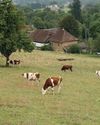
How to Buy a Smallholding in France- Long-time smallholder Lorraine Turnbull looks at the practicalities of moving to rural France
Aspiring smallholders are continually thwarted by the prices of smallholdings and property with land located within the UK. Even the humblest croft in Scotland comes with a substantial price tag and conditions which would make even an adventurous wannabee consider carefully. But all is not lost. For those willing to take the adventure of a lifetime, there is always Europe, and one of the most popular places is France.

Meet the Bournemouth goats and their supporters
These capricious animals are hard workers preserving the natural habitat

Still warm enough to sit outside with a Pizza
Henrietta Balcon uses fresh figs to create an unusual dish at Harvest time

Goodbye to the birds of spring and summer
If you look and listen you might be able to see them preparing to leave says The RSPB

Get ready for the colder weather in the warmth of late summer
Claire Waring advises on doing the best to make sure your colonies survive until next spring
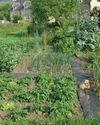
Preparing the Veg Patch for Winter
Lee Senior says, a well-run plot can excitingly continue to produce good quality, tasty, fresh food for much of winter
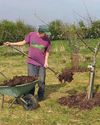
Time to prepare to plant your orchard
Wade Muggleton, smallholder and author of The Orchard Book, shares his practical experience so you can create your own fruit collection
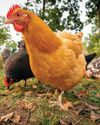
Choosing feed for the autumn
As autumn approaches, Joanna Palmer, nutritionist at the Smallholder Range, offers advice on choosing the right feed to support your adult birds through their annual moult and ensure your young birds grow and finish well at this time of the year.
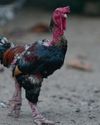
Vet advice from an experienced poultry vet
Reflecting on how much the humble hen has helped people world wide plus advice on stopping the scourge of red mite

Give your hens some support
Paul Donovan looks at the right and wrong ways of handling birds